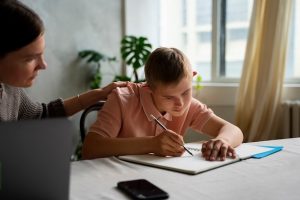Effective Online Speech Therapy for Aphasia
Last Updated: September 11, 2024
Imagine improving your communication skills from the comfort of your own home. With the advancements in digital health, online speech therapy for aphasia offers a convenient and effective way to enhance language abilities. Aphasia, typically caused by stroke or brain injury, impairs the ability to speak, read, write, and understand language. Access to regular, flexible therapy is vital for recovery. Our online speech therapy programs provide personalized treatment plans tailored to meet individual needs, making expert care accessible to everyone, anywhere. Start your journey to better communication today!
What is Aphasia?
Aphasia is a communication disorder that affects a person’s ability to understand, speak, read, or write. It typically occurs after a stroke or brain injury damages the parts of the brain responsible for language. Living with aphasia can be challenging, but understanding the different types of aphasia can help in managing the condition more effectively.
1. Receptive Aphasia
Receptive Aphasia, also known as Wernicke’s aphasia, makes it difficult for individuals to understand spoken or written language. In severe cases, a person might not comprehend words at all but can still understand gestures or the use of objects. In milder cases, they might struggle to follow conversations or process large amounts of information.
2. Expressive Aphasia
Expressive Aphasia, also called Broca’s aphasia, affects a person’s ability to speak. Individuals with this type of aphasia often know what they want to say but have trouble finding the right words. This can lead to frustration as they may say incorrect words or be unable to articulate their thoughts clearly.
Also read: Aphasia: Causes, Symptoms, Types and Treatment
3. Acquired Dyslexia
Acquired Dyslexia refers to difficulties in reading that develop after a brain injury or stroke. People with this condition may have trouble recognizing short words or comprehending longer paragraphs. Visual and memory issues can also accompany these reading difficulties.
4. Acquired Dysgraphia
Acquired Dysgraphia involves difficulties in writing. In severe cases, individuals might be unable to write their own name. In milder cases, they may find it challenging to write lengthy emails or letters. This condition can be particularly frustrating for those who previously enjoyed writing.
Types of Aphasia and Symptoms
| Type of Aphasia | Symptoms |
|---|---|
| Receptive Aphasia | Difficulty understanding spoken or written language. Patients may struggle to comprehend words, follow conversations, or understand large chunks of information. |
| Expressive Aphasia | Difficulty in speaking. Patients may have trouble finding the right words, constructing sentences, or may use incorrect words. This often leads to frustration. |
| Acquired Dyslexia | Difficulty in reading. Patients may struggle with recognizing short words, understanding paragraphs, or interpreting written information like emails or newspapers. |
| Acquired Dysgraphia | Difficulty in writing. Patients may find it hard to write their name, form sentences, or construct longer written pieces like emails or letters. |
Causes of Aphasia
Aphasia is a condition that can profoundly impact one’s ability to communicate, often resulting from damage to specific areas of the brain responsible for language. Understanding the common causes of aphasia can help in its management and treatment. Here are some of the primary causes:
Stroke
Stroke is the most common cause of aphasia. When a stroke occurs, it disrupts the blood flow to parts of the brain, leading to damage. If the stroke affects the left hemisphere, where language centers are typically located, it can result in aphasia. Prompt medical intervention and rehabilitation can significantly improve outcomes for stroke survivors.
Also read: Regain Your Voice: Speech Therapy After Stroke
Severe Head Injury
Aphasia can also result from severe head injuries. Traumatic brain injuries (TBIs) from accidents, falls, or other impacts can damage the brain’s language areas. The severity of aphasia depends on the location and extent of the injury. Rehabilitation and therapy are crucial for recovery and improving communication skills.
Brain Tumor
Brain tumors, whether benign or malignant, can cause aphasia if they grow in or press against the brain’s language regions. Treatment options such as surgery, radiation, or chemotherapy may be necessary to address the tumor. Speech therapy plays a vital role in helping individuals regain their language abilities post-treatment.
Progressive Neurological Conditions
Progressive neurological conditions like dementia can gradually lead to aphasia. As these diseases progress, they can affect various cognitive functions, including language. Conditions such as Alzheimer’s disease and frontotemporal dementia are examples where aphasia may develop over time. Early intervention and consistent therapy can help manage the symptoms.
What is Online Speech Therapy?
Online speech therapy, also known as tele practice, is a modern approach to delivering speech therapy services through the internet. This method leverages video and audio technology to connect therapists with individuals who need help improving their communication skills, all from the comfort of their own homes.
Telepractice involves real-time interaction between the therapist and the patient using a computer, tablet, or smartphone. Sessions are conducted through video conferencing platforms like Zoom, TeleBASICS which allows for face-to-face communication similar to in-person visits. This setup enables therapists to observe and interact with their clients effectively, ensuring that therapy is both personal and effective.
Also read: Revolutionize Speech Therapy with Wellness Hub’s Tele Basics
During a typical online speech therapy session, both the therapist and the patient log into a secure video conferencing platform at a scheduled time. The therapist guides the patient through various exercises and activities designed to improve their speech and language abilities. These sessions can be tailored to address specific issues such as aphasia, stuttering, articulation disorders, and more.
The use of technology in speech therapy offers several advantages:
- Convenience: Patients can receive therapy without the need to travel, saving time and making it easier to fit sessions into their busy schedules.
- Accessibility: Online therapy is especially beneficial for individuals living in remote areas or those with mobility issues.
- Flexibility: Sessions can be scheduled at times that are most convenient for the patient, including evenings and weekends.
- Personalization: Therapists can use a variety of digital tools and resources to create a customized therapy plan that meets the unique needs of each patient.
Benefits of Online Speech Therapy for Aphasia
Online speech therapy offers numerous advantages, particularly for individuals dealing with aphasia. Here are some key benefits that make it an effective and appealing option:
Convenience of Receiving Therapy at Home
One of the most significant benefits of online speech therapy for aphasia is the convenience of receiving treatment without leaving home. This setup eliminates the need for travel, allowing patients to engage in therapy sessions from a familiar and comfortable environment. It also helps reduce stress and anxiety that might come with traveling to a clinic, leading to a more relaxed and effective therapy experience.
Accessibility for Those in Remote Areas or with Limited Mobility
Online speech therapy breaks down geographical barriers, making high-quality therapy accessible to individuals living in remote or underserved areas. For those with limited mobility, whether due to the severity of their aphasia, other health conditions, or logistical challenges, online therapy provides an invaluable opportunity to receive consistent and professional care. This accessibility ensures that more people can benefit from speech therapy, regardless of their location or physical limitations.
Flexibility in Scheduling Sessions
Another notable advantage is the flexibility in scheduling therapy sessions. Online speech therapy allows patients and therapists to find mutually convenient times for sessions, including evenings and weekends. This flexibility is particularly beneficial for those with busy schedules or caregiving responsibilities. Patients can fit therapy into their daily routines without the added pressure of adhering to traditional clinic hours.
Ability to Use Advanced Technology and Apps for Therapy
Online speech therapy leverages advanced technology and various digital tools to enhance the therapy process. Therapists can incorporate interactive apps, video exercises, and other digital resources to make sessions more engaging and effective. These tools can help reinforce learning, track progress, and provide additional practice outside of scheduled sessions. Using technology also allows for the easy sharing of resources and personalized therapy plans tailored to each patient’s specific needs.
How Online Speech Therapy Works
Starting with online speech therapy for aphasia is a straightforward process designed to provide personalized care and support. Here’s an outline of how it typically works:
Initial Assessment and Goal Setting
The first step in online speech therapy is an initial assessment. During this session, a licensed speech therapist evaluates the patient’s communication abilities and identifies specific areas that need improvement. This assessment helps in understanding the severity of aphasia and setting realistic, personalized therapy goals. The therapist will discuss these goals with the patient and their family, ensuring everyone is on the same page and ready to work towards a common objective.
Regular Sessions via Video Calls
Once the goals are set, regular therapy sessions are scheduled. These sessions are conducted via video calls using secure platforms like Zoom. During each session, the therapist guides the patient through targeted exercises and activities aimed at improving speech, language, and communication skills. The frequency and duration of these sessions are tailored to meet the patient’s unique needs and progress.
Use of Technology and Apps to Aid Therapy
Technology plays a crucial role in online speech therapy. Therapists use various digital tools and apps to make the sessions more interactive and effective. These may include speech therapy apps that provide practice exercises, games that help with language development, and software that tracks progress. Utilizing these technologies allows patients to continue practicing their skills outside of therapy sessions, enhancing their overall progress and engagement.
The Role of Family Members in Supporting Therapy
Family support is vital in the therapy process. Therapists often involve family members in sessions to help them understand how to support their loved ones effectively. They provide guidance on communication strategies, offer tips for creating a supportive environment, and encourage active participation in therapy activities. Family members can also help by reinforcing the exercises and techniques learned during therapy sessions, providing consistent and meaningful practice opportunities at home.
Effectiveness of Online Speech Therapy for Aphasia
Online speech therapy for aphasia has proven to be just as effective as traditional in-person sessions. Various studies and statistics highlight the success and benefits of this modern approach.
Evidence Supporting Online Speech Therapy
Research has shown that online speech therapy for aphasia can deliver comparable outcomes to face-to-face therapy. A study published in the journal Telemedicine and e-Health found that patients receiving online speech therapy made significant improvements in their communication skills, similar to those receiving traditional therapy. The convenience and flexibility of online sessions did not compromise the quality of care or the progress made by patients.
Another study in the Journal of Medical Internet Research reported that online speech therapy is particularly beneficial for individuals with limited access to in-person services. Patients in rural or remote areas, who might otherwise go without therapy, were able to receive consistent and effective treatment through online platforms. This increased accessibility led to better overall outcomes for a broader range of patients.
Statistics Supporting Online Speech Therapy
Statistics also support the effectiveness of online speech therapy. According to a survey conducted by the American Speech-Language-Hearing Association (ASHA), over 90% of speech therapists reported positive outcomes using telepractice for aphasia. They noted improvements in patients’ language skills, increased engagement, and high levels of satisfaction with the online format.
Furthermore, a review in Clinical Rehabilitation highlighted that patients and their families appreciate the convenience of online therapy. Many reported feeling more comfortable and less stressed during sessions conducted at home, which contributed to better participation and progress.
Types of Online Speech Therapy for Aphasia
Online speech therapy for aphasia encompasses various approaches tailored to meet the unique needs of each patient. Two primary types of therapy are Impairment-based Therapy and Functional Therapy. Both play crucial roles in helping individuals improve their communication skills.
Impairment-based Therapy
Impairment-based therapy focuses on addressing specific language deficits through repeated exercises. This type of therapy aims to improve the underlying skills necessary for communication. Here’s how it works:
- Repetition: Patients engage in exercises that target specific areas of difficulty, such as word retrieval, sentence construction, and pronunciation. Repeating these exercises helps strengthen neural connections in the brain.
- Drills and Activities: Therapists use a variety of drills, including naming exercises, flashcards, and language games, to help patients practice and improve their language abilities.
- Progress Tracking: Regular assessments are conducted to track progress and adjust the therapy plan as needed. This ensures that the therapy remains effective and aligned with the patient’s evolving needs.
Impairment-based therapy is particularly beneficial for those who need to rebuild fundamental language skills. By focusing on specific impairments, patients can gradually regain their ability to communicate more effectively.
Functional Therapy
Functional therapy, on the other hand, emphasizes real-life communication goals. It focuses on improving a patient’s ability to interact and communicate in everyday situations. Here’s what this approach involves:
- Real-life Scenarios: Therapy sessions are designed to mimic real-life interactions, such as ordering food at a restaurant, having a conversation with a friend, or making a phone call. This helps patients practice and apply their skills in meaningful contexts.
- Role-playing: Therapists use role-playing exercises to simulate common situations that patients might encounter. This provides a safe and supportive environment for patients to practice their communication skills.
- Family Involvement: Family members are often included in therapy sessions to help them learn how to support the patient’s communication efforts. This collaborative approach ensures that patients have ample opportunities to practice outside of formal therapy sessions.
Practical Tips for Online Speech Therapy Sessions
Online speech therapy for aphasia can be incredibly effective when conducted in the right environment and with the proper preparation. Here are some practical tips to ensure your sessions are successful:
Ensure a Quiet, Well-Lit Space
Creating the right environment is crucial for effective online speech therapy. Find a quiet room where you won’t be interrupted. Background noise can be distracting and make it harder to focus on the session. Additionally, ensure the space is well-lit so that both you and your therapist can see each other clearly. Good lighting helps the therapist observe facial expressions and mouth movements, which are essential for accurate assessment and feedback.
Use Reliable Internet and Devices
A stable internet connection is vital for seamless online therapy sessions. Make sure your internet is reliable and has sufficient speed to support video calls. Using a wired connection, if possible, can help avoid interruptions. Ensure your device—whether it’s a computer, tablet, or smartphone—is fully charged or plugged in during the session. Check that your camera and microphone are working correctly to facilitate clear communication.
Be Patient and Give Ample Response Time
Patience is key during online speech therapy sessions. Communication can sometimes be slower in a virtual setting, so give yourself and your therapist time to understand and respond. Don’t rush through exercises or conversations. Allowing ample response time helps in reducing frustration and ensures that you are effectively working through each exercise. This approach is particularly important for those with aphasia, as they may need extra time to process and respond.
Use Visual Aids and Gestures to Enhance Understanding
Visual aids and gestures can significantly enhance communication during online therapy. Use objects, pictures, or drawings to help illustrate your points or to better understand what the therapist is explaining. Gestures, such as pointing or miming actions, can also aid in conveying meaning and ensuring clarity. These tools make the therapy sessions more interactive and can help bridge any gaps in understanding.
Conclusion
Online speech therapy for aphasia provides significant advantages, blending convenience with cutting-edge technology. Tailored to meet individual needs through impairment-based and functional approaches, this mode of therapy delivers effective, personalized treatment right at your doorstep. Ideal for those in remote locations or with mobility challenges, it offers flexible scheduling to fit your lifestyle. At Wellness Hub, we leverage the latest techniques and technologies to enhance communication and improve life quality. Discover the transformative potential of online speech therapy—visit our website for more information. Embark on your journey to better communication with Wellness Hub; a single step can lead to remarkable improvements.
Frequently Asked Questions:
1. What is online speech therapy for aphasia?
Online speech therapy for aphasia involves delivering speech therapy services through video calls and digital platforms. It allows individuals with aphasia to receive therapy from the comfort of their home using a computer or mobile device.
2. How does online speech therapy help with aphasia?
Online speech therapy helps individuals with aphasia improve their communication skills through personalized exercises and activities. It provides targeted treatment to address specific language deficits and helps patients practice real-life communication scenarios.
3. Is online speech therapy as effective as in-person therapy?
Yes, studies have shown that online speech therapy is as effective as traditional in-person therapy for treating aphasia. It offers the same quality of care and can lead to significant improvements in communication skills.
4. What technology is needed for online speech therapy?
To participate in online speech therapy, you need a reliable internet connection, a computer or mobile device with a camera and microphone, and access to a video conferencing platform like Zoom.
5. Can online speech therapy be customized to individual needs?
Absolutely. Online speech therapy sessions are tailored to meet each patient’s unique needs. Therapists create personalized therapy plans based on the initial assessment and ongoing progress.
6. What are the benefits of online speech therapy for aphasia?
The benefits include convenience, accessibility, flexible scheduling, and the use of advanced technology and apps. It allows patients to receive therapy from home, which can reduce stress and make therapy more consistent.
7. How often are online speech therapy sessions conducted?
The frequency of sessions depends on the individual’s needs and therapy goals. Typically, sessions are scheduled regularly, such as once or twice a week, but this can be adjusted based on progress and availability.
8. Can family members be involved in online speech therapy sessions?
Yes, family members are encouraged to participate in sessions. They can learn strategies to support the patient’s communication efforts and reinforce exercises and techniques at home.
9. What should I expect during an online speech therapy session?
During an online speech therapy session, you can expect to engage in various exercises and activities aimed at improving your communication skills. The therapist will guide you through each exercise and provide feedback and support.
10. How do I start with online speech therapy for aphasia at Wellness Hub?
To start with online speech therapy at Wellness Hub, visit our website and contact us to schedule an initial assessment. Our experienced therapists will work with you to develop a personalized therapy plan and guide you through the process.
About the Author:
Anuradha Karanam
Speech-language pathologist (7+ years of experience)
Anuradha Karanam is a skilled speech-language pathologist with over 6 years of experience. Fluent in Tamil, Telugu, Hindi, and English, she specializes in parent counseling, speech sound disorders, fluency assessment, and speech-language evaluations. Anuradha excels at working with children with developmental disorders, offering creative and effective therapy programs. Currently, at Wellness Hub, she holds a BASLP degree and is registered with the RCI (CRR No A85500). Her patience, ambition, and dedication make her a trusted expert.
Book your Free Consultation Today
Parent/Caregiver Info:
Client’s Details:
* Error Message








